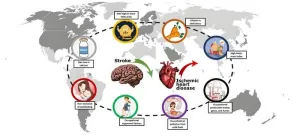(Press-News.org) Researchers at Duke University School of Medicine have found that tapping into the nervous system could help reduce the gut inflammation that drives inflammatory bowel disease (IBD).
A new study led by Luis Ulloa, PhD, and Wei Yang, PhD, reveals how electrical stimulation of the vagus nerve—a major nerve connecting the brain and gut—may combat the stress-related inflammation that worsens IBD symptoms.
Published in Science Translational Medicine, the study showed that vagus nerve stimulation in stressed mice with colitis, a form of IBD, reduced inflammation, improved symptoms, and boosted survival rates. By engaging the parasympathetic nervous system, the team observed that inflammation could be eased by inhibiting SUMOylation, a cellular process that shapes immune response.
Modulating SUMOylation—either through vagal nerve stimulation or treatment with a SUMOylation inhibitor—could open the door to IBD therapies that focus on managing inflammation directly, rather than alleviating symptoms.
In 2022, Duke researchers, backed by the National Institutes of Health, began investigating whether stimulating the vagus nerve could affect SUMOylation and set off a natural anti-inflammatory response that calms immune responses and reduces inflammation.
The new study is the first to show that targeting specific forms of SUMOylation could prevent the harmful influx of immune cells that can trigger gut inflammation. First study author and former Duke research scholar Ayman Youssef, MD, a clinical fellow of autonomics at Vanderbilt Medical Center, analyzed data identifying that inhibiting SUMOylation, through genetic or drug-based approaches, dramatically slowed disease progression in mouse models.
“One surprising finding of this study is that inhibiting SUMOylation appears to mimic the beneficial effects of vagal stimulation, resulting in improved clinical symptoms of colitis,” said Yang, professor of anesthesiology and associate professor of neurology at Duke School of Medicine.
IBD cases are soaring—up 50% in the last 15 years. Scientists are intensifying efforts to reduce inflammation-causing cells in the intestines and improve treatment options for the nearly 7 million people affected worldwide.
IBD includes two primary types: ulcerative colitis, which affects the colon, and Crohn’s disease, which can inflame any part of the digestive tract. Both conditions disrupt lives and can lead to serious complications like colon perforation, cancer, and even early mortality.
Current anti-inflammatory treatments bring relief but often fall short, as patients can lose their response to these medications over time, suffer relapses, and experience significant side effects.
Researchers have long noted that stress plays a significant role in exacerbating IBD symptoms, and some have even described ulcerative colitis as psychosomatic.
“Stimulating the vagus nerve neutralized the effects of stress and restored a balanced and healthy physiologic state,” said Ulloa, a Duke researcher, the leading andcorresponding author of the study. “Many relaxation techniques, like deep breathing and meditation, are designed to enhance the parasympathetic system, with the vagus nerve playing a central role in relaxing most of our organs.
“Although previous studies have suggested the role of the vagus nerve, our study demonstrates that its effect is mediated through regulating SUMOylation, he said.
Ulloa warns that not all patients may respond similarly, and translating the findings from lab studies to clinical settings could lead to varying outcomes, or no benefit at all. The approach, called “bioelectronic medicine,” is part of an emerging field where nerve stimulation is being explored to treat various inflammatory conditions from rheumatoid arthritis to Crohn’s disease.
Additional Authors: Ata Ur Rehman, Mohamed Elebasy, Jatin Roper of Duke School of Medicine; Shehzad Z. Sheikh of University of North at Carolina Chapel Hill and Jorn Karhausen, of Duke and Humanitas Research Hospital.
Funding for the study was provided by the NIH National Center for Complementary and Integrative Health (AT011387), National Institute of Diabetes, Digestive and Kidney Diseases (P01DK094779, 1R01DK104828, and P30-DK034987) and the Helmsley Charitable Trust.
END
How nerve stimulation could ease inflammatory bowel disease
Lab studies at Duke School of Medicine finds vagus nerve stimulation reduces gut inflammation by modulating immune response
2024-11-20
ELSE PRESS RELEASES FROM THIS DATE:
The factors behind the shifting trends of ischemic heart disease and stroke
2024-11-20
Incidence of stroke and ischemic heart disease are declining around the world, except for in a handful of regions, according to research in the open access journal PLOS Global Public Health. Wanghong Xu of Fudan University and colleagues find that in East and West Sub-Saharan Africa, East and Central Asia and Oceania, ischemic heart disease is increasing, which may be attributed to eight factors that include diet, high BMI, household air pollution and more.
Cardiovascular disease is a leading cause of death and disability worldwide, and ischemic heart disease and stroke ...
How educational attainment may impact memory and dementia risk later in life
2024-11-20
Historical policies shaping educational attainment have enduring benefits for later life memory and risk of dementia, according to a study led by a Rutgers Health researcher.
The study, published in Epidemiology, compared the differences in years of education based on variations in state schooling mandates with cognitive performance outcomes in residents decades later.
“Policies to increase the quantity or quality of schooling now are likely to have long-term benefits on cognitive outcomes,” ...
Growing soybeans has a surprisingly significant emissions footprint, but it’s ripe for reduction
2024-11-20
AMES, Iowa – Over the typical two-year rotation of corn and soybeans most Iowa farmers use, 40% of nitrous oxide emissions are in the soybean year, according to a new study by an Iowa State University research team.
The share of the potent greenhouse gas released during the soybean half of a crop rotation cycle is surprisingly high, given most soybeans fields aren’t treated with nitrogen, said Michael Castellano, agronomy professor and William T. Frankenberger Professor of Soil Science at Iowa State University.
“We’ve just been assuming that legume crops like soybeans don’t have a big emissions footprint because they don’t ...
$6 million grant drives potential treatment for common cause of vision loss toward the clinic
2024-11-20
The California Institute for Regenerative Medicine (CIRM), the state’s stem cell agency, has awarded a two-year, $6 million grant to a team at the USC Dr. Allen and Charlotte Ginsburg Institute for Biomedical Therapeutics and the USC Roski Eye Institute advancing a new treatment for one of the leading causes of blindness in older adults. The funding will enable the researchers to conduct preclinical studies needed before launching human trials.
The investigators aim to accelerate progress in fighting dry age-related macular degeneration (AMD), which affects ...
Research aims to roll back contamination caused by toxic tires
2024-11-20
University of Delaware researchers have developed a method for mitigating the decontamination that tires release into the environment at the end of their lifespan.
In a new study published in Nature Chemical Engineering, the team demonstrated a way to upgrade 6PPD – a molecule that provides UV protection to help the rubber found in tires last longer – into safe chemicals. The method would also turn the leftover crumb rubber into aromatics and carbon black, a soot-like material found in everything from pigments to cosmetics to electronics. ...
School social workers an underutilized resource
2024-11-20
Youth in America are experiencing a mental health crisis, according to the Centers for Disease Control and Prevention (CDC). The CDC reports that an increasing number of students are experiencing symptoms of hopelessness, depression, and anxiety, along with thoughts of self-harm.
One thing known to improve mental health among students is increased school connectedness—when students feel that the adults and peers in their school care about them as individuals in addition to their learning ability. Schools are working to improve their connectedness by adding social workers to their staff to help address the mental health concerns of students.
However, ...
Increasing complexity challenges strategic management
2024-11-20
The changes in society and the phenomena surrounding us are becoming more unexpected and interconnected than ever before. This increasing complexity challenges strategic management, making it harder to predict trends and developments. According to a new study from the University of Vaasa, Finland, increased complexity demands new approaches to strategic management.
– In strategic management, it is essential to acknowledge the growth of complexity and understand how to influence complexity ...
Morton Arboretum tree root scientist recognized as top-cited researcher for second straight year
2024-11-20
LISLE, Ill. (Nov. 20, 2024)— For the second year in a row, The Morton Arboretum’s Tree Root Biologist Luke McCormack, Ph.D., has been recognized as one of the most cited and influential researchers worldwide by global information services provider Clarivate’s esteemed annual list of “Highly Cited Researchers.”
The 2024 list, released Nov. 19, includes influential researchers at universities, research institutes and commercial organizations around the world, who have demonstrated significant and broad influence in their research field(s). McCormack, who debuted ...
Scientists show electrical stimulation could be key to healthy tendons
2024-11-20
A new study by researchers at the University of Galway and the University of Limerick suggests that electrical stimulation might be essential for tendons to maintain their health, offering fresh possibilities in tendon repair and regeneration.
The research took place at the CÚRAM Research Centre for Medical Devices, funded through Taighde Éireann – Research Ireland, formerly Science Foundation Ireland.
Tendons resist intense mechanical stress, while facilitating force transmission from muscles to bones. They are also piezoelectric, meaning that when they are stretched, they will produce an electric ...
University Hospitals only health system in northeast Ohio offering FDA-approved KISUNLA™ for treatment of Alzheimer’s disease
2024-11-20
CLEVELAND--University Hospitals Brain Health & Memory Center is now treating patients with KISUNLA™ (donanemab), a Food and Drug Administration-approved medication for the treatment of Alzheimer’s disease. UH is the only health system in Northeast Ohio currently offering these infusion treatments. Donanemab has shown promise in clinical trials and may be a treatment option for patients with mild cognitive impairment and mild dementia due to Alzheimer’s disease.
“People with Alzheimer’s disease have an abnormal buildup of plaques in their brain ...
LAST 30 PRESS RELEASES:
Ketamine high NOT related to treatment success for people with alcohol problems, study finds
1 in 6 Medicare beneficiaries depend on telehealth for key medical care
Maps can encourage home radon testing in the right settings
Exploring the link between hearing loss and cognitive decline
Machine learning tool can predict serious transplant complications months earlier
Prevalence of over-the-counter and prescription medication use in the US
US child mental health care need, unmet needs, and difficulty accessing services
Incidental rotator cuff abnormalities on magnetic resonance imaging
Sensing local fibers in pancreatic tumors, cancer cells ‘choose’ to either grow or tolerate treatment
Barriers to mental health care leave many children behind, new data cautions
Cancer and inflammation: immunologic interplay, translational advances, and clinical strategies
Bioactive polyphenolic compounds and in vitro anti-degenerative property-based pharmacological propensities of some promising germplasms of Amaranthus hypochondriacus L.
AI-powered companionship: PolyU interfaculty scholar harnesses music and empathetic speech in robots to combat loneliness
Antarctica sits above Earth’s strongest “gravity hole.” Now we know how it got that way
Haircare products made with botanicals protects strands, adds shine
Enhanced pulmonary nodule detection and classification using artificial intelligence on LIDC-IDRI data
Using NBA, study finds that pay differences among top performers can erode cooperation
Korea University, Stanford University, and IESGA launch Water Sustainability Index to combat ESG greenwashing
Molecular glue discovery: large scale instead of lucky strike
Insulin resistance predictor highlights cancer connection
Explaining next-generation solar cells
Slippery ions create a smoother path to blue energy
Magnetic resonance imaging opens the door to better treatments for underdiagnosed atypical Parkinsonisms
National poll finds gaps in community preparedness for teen cardiac emergencies
One strategy to block both drug-resistant bacteria and influenza: new broad-spectrum infection prevention approach validated
Survey: 3 in 4 skip physical therapy homework, stunting progress
College students who spend hours on social media are more likely to be lonely – national US study
Evidence behind intermittent fasting for weight loss fails to match hype
How AI tools like DeepSeek are transforming emotional and mental health care of Chinese youth
Study finds link between sugary drinks and anxiety in young people
[Press-News.org] How nerve stimulation could ease inflammatory bowel diseaseLab studies at Duke School of Medicine finds vagus nerve stimulation reduces gut inflammation by modulating immune response





